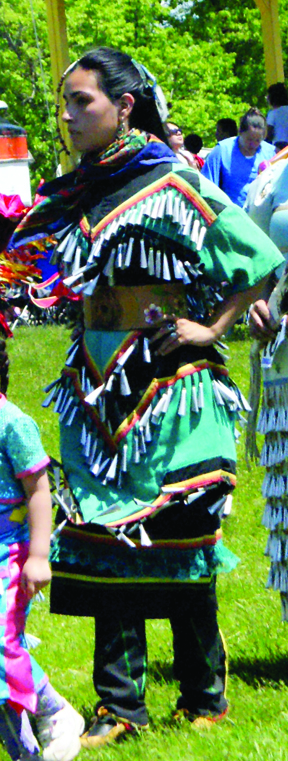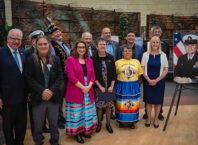
Josette Croud (White Earth Ojibwe), a Minneapolis 2009 South High graduate, has received the prestigious Gates Millennium Scholarship based on her academic achievement, test scores, and personal essay – which described her enormous perseverance despite the many obstacles she’s faced in her life. The national scholarship program, which began in 1999, was originally funded by a $1 billion grant from the Bill & Melinda Gates Foundation. The scholarship promotes academic excellence and provides an opportunity for outstanding minority students with significant financial need to attend college.
Croud, who lives in Northeast Minneapolis and attended South High School’s Open program, was accepted to several colleges including Hamline, Gustavus Adolphus, and Augsburg and was asked to waitlist at Lawrence University. But she chose the University of Minnesota – Crookston where she plans to pursue a B.S. degree in Equine Science. Beyond that, Josette would like to get a graduate degree in psychology.
The scholarship will pay for four years of secondary schooling and in some cases, can be extended to graduate school. Croud hopes to combine her love of horses and her counseling skills to someday develop a residential program for at-risk, adolescent girls using equine assisted therapy. “I have always loved horses,” said Croud, who is currently working at a summer job as barn crew at the Leatherdale Equine Center and at the Large Animal Hospital at the University of Minnesota, where she cleans and takes care of the horses.
Croud used to love watching the horse-drawn carriages from the Hitching Company ride by the river where she lives. “When I turned 16,” Croud said, “I decided to talk to them.” She offered to volunteer, thinking she was too young to get a job, but within a few days she was hired to prepare, groom, and harness the horses.
Josette’s dad is Joseph Croud (White Earth Ojibwe), an artist who makes traditional Ojibwe flutes and dance headdresses. Her mother is Jeanne Boutang Croud (Red Lake and Pembina Band).
Jeanne Croud said her daughter had a difficult decision to make about which college to attend, “Josette is also a talented artist and photographer and it was a difficult decision to choose a school that does not have a large art department. But she intends to continue her art education in graduate school.”
Josette said that pursuing her interest in horses helped her get through some difficult high school years.
Croud has survived a number of challenges, including an anxiety disorder which manifests itself around school performance and testing, Central Auditory Processing Disorder, which affects how she interprets words she hears, and moderate dyslexia. Her most difficult struggle has been with ongoing Hemiplegic Migraines, a rare neurological disorder related to migraine headaches but with additional somatic symptoms that mimic stroke or seizure.
In December 2006, Croud was in class and realized she had a headache worse than any she’d ever had before. “At the end of school day, it was so intense, I remember getting tingly on the right side,” Croud said. She developed twitching on the right side of her face, which became completely paralyzed. “I just remember the pain, the commotion, and being paralyzed,” she said. Her mom happened to be at the school that day, and took Croud to the hospital. After having migraines, Croud has suffered temporary vision and memory loss, and sometimes has had to re-learn basic tasks such as holding a pencil.
She had to miss a third of her sophomore year, enduring over a hundred episodes of pain and paralysis. Luckily, she had supportive teachers who would send her assignments by mail and let her do extra credit. During her junior and senior years, she attended classes at Metropolitan Community and Technical College (MCTC) through the Post Secondary Enrollment Option program (PSEO) which allows students to attend college classes for free. Despite all the obstacles, she was able to graduate from South High School with a 3.56 GPA.
To help deal with the physical ailments Croud turned to alternative therapy to supplement her other treatments. She tried acupuncture, and made changes to her diet, cutting out corn syrup and trans-fats, and taking herbal supplements and vitamins. She said focusing on a healthier lifestyle has helped reduce the number of migraines she gets.
Croud says the trauma of her disease helped her become a more rooted person. “It made me think about things on a deeper level,” Croud said. “Even though it was really terrible, and at times I couldn’t deal with it, overall it was one of the best learning experiences of my life.” She says another coping mechanism is her spirituality. She tries to stay close to her Ojibwe traditions and culture. When she was 2-years-old she started dancing the Fancy Shawl Dance at powwows. When she was 16, after her migraines started, she learned the Jingle Dress Dance, a dance of healing. “I try to dance as often as I can,” Croud said. “I’ll probably continue for the rest of my life. It is a really important and spiritual thing for me.”
When she attends Crookston, she plans to be involved in the Native community there, and take Ojibwe language classes. She said her Native ancestory is “something that I think about – who I am, and what my past is.” Croud feels that her involvement in the community is a full-time commitment, both in organized activities such as participation in powwows and Native programs, but that it is also a way of life.
Josette parents are very proud of both their children. Josette has an older brother, Solomon, who recently joined the U.S. Army and will be training to repair Apache helicopter and missile systems.
“I think my daughter is amazing. To me Josette represents the best of this generation of young Natives. These kids are entirely 21st century people who firmly root themselves in generations of ancient and family tradition,” said Jeanne.
The GMS is the nation’s largest minority scholarship program and in 2009 has awarded good-through-graduation college scholarships to 1,000 students from low-income families. The GMS model provide students with both financial assistance and academic and leadership mentoring and support. Its a combination that has lead to GMS recipients having an average graduation rate of almost 80 percent, higher than the graduation rate for all college students, and higher than the rate for high-income students.
The 1,000 students, who were notified April 15 that they had been selected, are from 48 States, the District of Columbia, Puerto Rico and Guam and are enrolling for the fall semester in 346 colleges and universities.
The GMS 2010 Nomination Process will launch August 1, 2009 with a deadline of January 11, 2010. For more information about the GMS, see website: www.gmsp.org.






